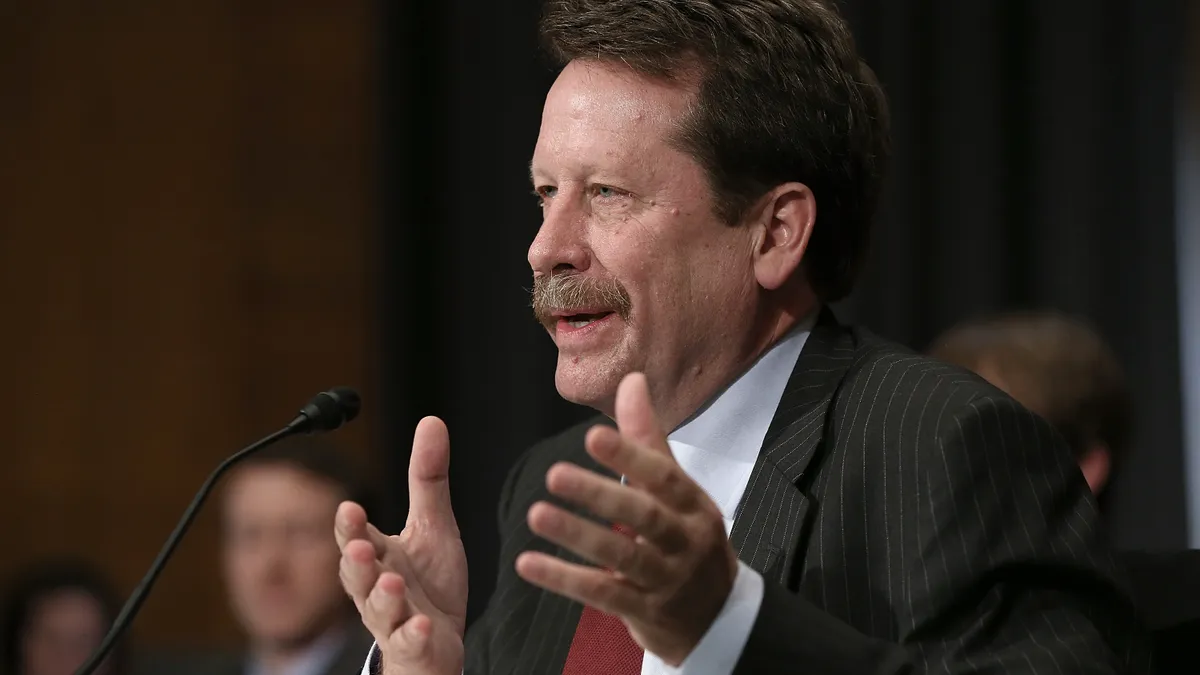President Joe Biden is considering nominating former FDA Commissioner Robert Califf to once again lead the agency, according to multiple media reports citing unnamed sources.
Nine months into the Biden administration, with the coronavirus pandemic still raging across the country, the White House has not settled on a permanent leader for the FDA.
Janet Woodcock, a longtime top agency official, has served as interim commissioner during the drawn-out search process, and was at one point considered a leading contender for the position. But her role overseeing the FDA’s main drug review office as opioid overdoses became a nationwide epidemic drew criticism from lawmakers, as did the agency’s controversial approval of Biogen’s Alzheimer’s drug under her watch.
The Washington Post first reported the administration was "closing in" on Califf in a story Thursday, citing unnamed sources.
Still, White House Press Secretary Jen Psaki said during a Thursday press briefing the administration has not settled on any one nominee but is "eager to do this in short order."
Califf served as the FDA commissioner from February 2016 to January 2017 at the end of the Obama administration. He was confirmed by a vote of 89-4 but still faced criticism for his connection to pharmaceutical companies as the country was dealing with the opioid epidemic.
If nominated, the former commissioner may still face opposition from Senate Democrats who voted against him in 2016 for continued ties with drugmakers.
Califf received over $93,000 in payments between 2014 and 2020 from multiple healthcare companies, including Merck & Co., AstraZeneca, Eli Lilly and Amgen, according to the Centers for Medicare and Medicaid Services' Open Payments Database. The payments were predominately for consulting fees, but payments were also made for food and beverage and travel and lodging.
Califf currently works as part of the leadership team for healthcare company Verily, a subsidiary of Google's parent company Alphabet. He is also a practicing cardiologist and professor at Duke University.
The Center for Devices and Radiological Health Director Jeff Shuren is managing a backlog of initiatives back burnered amid the pandemic, from negotiating the next round of industry user fees via MDUFA, applying regulatory flexibilities used during the crisis to traditional processes and piloting programs like one focused on safer technologies.
And pandemic-related work will linger, including working on emergency use authorizations that will expire once the public health emergency ends. The agency’s testing division stumbled early in the pandemic, criticized for moving too slowly in some cases but too quickly in others, like opening up antibody testing.
Cowen analysts wrote that Califf "would be a victory for supporters of the status quo at the agency when it comes to the overall approach to new drug reviews and interactions with industry," adding that "there is little reason to believe he would not be comfortably supported this time around."
In a 2016 column for the Journal of the American College of Cardiology, Califf touted the potential of wearable devices and personalized care, both of which have taken off since the 2016 piece, most notably over the last 18 months due to the pandemic.
As the use of wearables and personalized devices was proliferating, Califf urged cardiologists to help develop effective, technical feasibility studies and ethical considerations. The then-FDA commissioner also wrote that the use of unique device identifiers, or UDIs, which are now being used more broadly, would help track devices through their product lifestyle and help gain insights into device-related outcomes.











